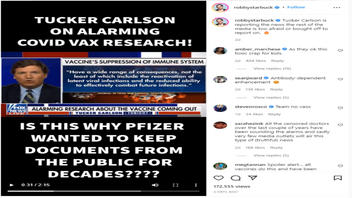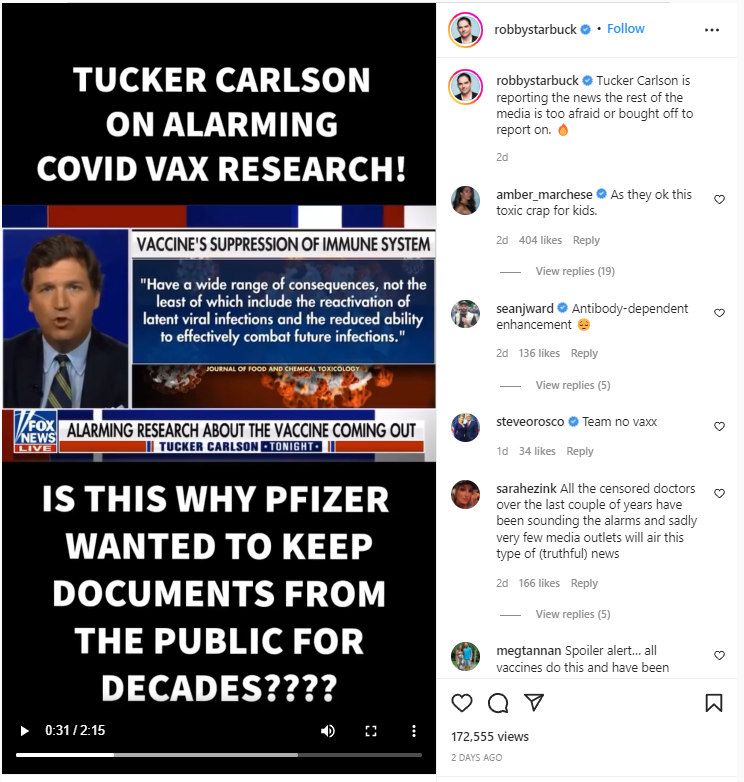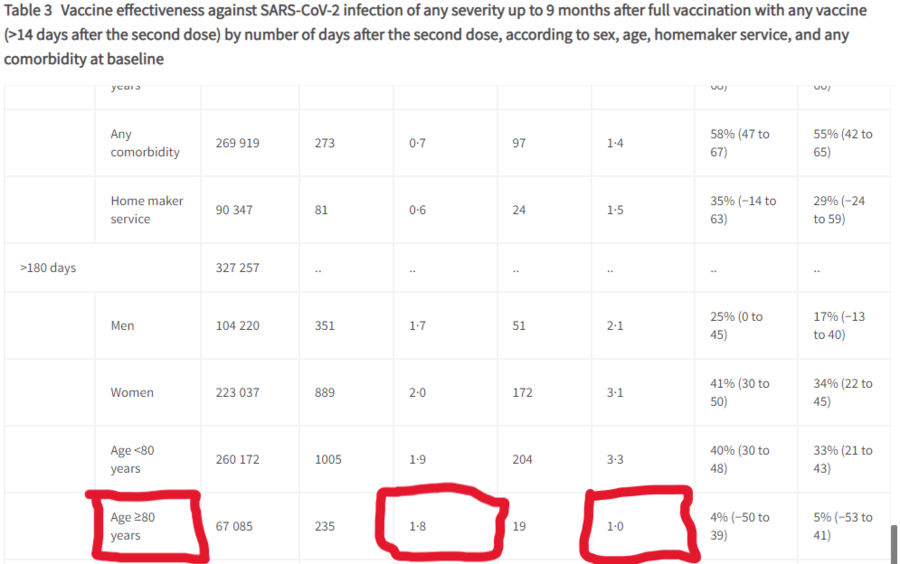STORY UPDATED: check for updates below.

Do COVID-19 vaccines suppress the human immune system? No, that's not true: There is nothing to suggest that COVID shots have that sort of impact on the body's defenses. "There is no clinical or epidemiological evidence that COVID vaccines generally suppress or weaken the immune system," Dr. William Schaffner, a professor of medicine in the division of infectious diseases at Vanderbilt University Medical Center, told Lead Stories.
The claim appeared in an Instagram post and video on July 22, 2022, under the title "TUCKER CARLSON ON ALARMING COVID VAX RESEARCH!" It opened:
Tucker Carlson is reporting the news the rest of the media is too afraid or bought off to report on. 🔥
This is what the post looked like at the time of writing:
(Source: Instagram screenshot taken on Mon Jul 25 17:03:29 2022 UTC)
The video
In just over two minutes, Carlson cites a paper, a study and a letter to a medical editor as evidence of how the vaccines are allegedly decimating the human immune system. The video is an excerpt from Carlson's July 21, 2022, show on the Fox News Channel. The clip opens with a partial quote from the paper, which suggests several conditions that could be caused by COVID shots. Carlson continues with his interpretation of the information:
'[These disturbances potentially have a causal] link to neurodegenerative disease... myocarditis, Bell's Palsy, liver disease, impaired adaptive immunity, impaired DNA damage response, etc.'
So, it's possible. In fact, it's looking likely that the vaccine might suppress the immune system. This fact, the authors concluded, will 'have a wide range of consequences, not the least of which include the reactivation of latent viral infections and the reduced ability to effectively combat future infections.' Now again, we sincerely hope that's not true, but it's not just the conclusion of one scientific journal.
The paper
The paper, "Innate immune suppression by SARS-CoV-2 mRNA vaccinations: The role of G-quadruplexes, exosomes, and MicroRNAs," was previously debunked by Lead Stories in its claim that COVID-19 vaccines suppress innate immunity and increase the risk of infectious diseases and cancer. One of its authors, Dr. Peter A. McCullough, is not a vaccinologist nor an immunologist. Baylor University Medical Center, where he was a cardiologist, fired him when he became a major spreader of COVID misinformation and filed a million-dollar suit against him for using the university's name when making claims like this about COVID vaccines.
Although experts in the same field sometimes disagree, medical science discourages people from asserting expertise outside their field. McCullough is not trained in vaccine development or immunology. His online resume lists his specialty as coronary artery disease and his board certification as cardiology. Searching his publishing history on ORCID (a system that tracks each researcher's output), Lead Stories found more than two dozen pieces of published research, mostly on cardiology, but none on the topic of spike proteins, nor the mechanisms by which mRNA vaccines work. Lead Stories found no McCullough-authored studies on vaccinology or immunology in the catalog of the National Library of Medicine, which provides the world's largest index of medical science journals.
The second author is Stephanie Seneff. She's a senior research scientist at the MIT Computer Science and Artificial Intelligence Laboratory. She has no medical degree. Lead Stories previously debunked a claim where she provided no proof COVID-19 vaccines have possible long-term side effects. Lead Stories debunked another claim by Seneff involving celiac disease and gluten intolerance.
The third author is Greg Nigh. The bio on his website says he's completed both the Naturopathic Doctor (ND) and the Master of Science in Oriental Medicine (MSOM) programs at the National University of Natural Medicine.
The fourth and final author is Anthony Kyriakopoulos. He's the head of research and development at Nasco A.D. Biotechnology Laboratory. His LinkedIn bio says he has a doctorate of philosophy in clinical and molecular microbiology from the University of Athens School of Medicine.
The medical journal study and letter to the editor
Carlson goes on to cite a study in the medical journal The Lancet, "Risk of infection, hospitalisation, and death up to 9 months after a second dose of COVID-19 vaccine: a retrospective, total population cohort study in Sweden," which he pairs with a letter to the editor of the Virology Journal by Dr. Kenji Yamamoto, a cardiovascular surgeon, to support his claim that COVID vaccines suppress the immune system.
The Lancet study makes no mention of a weakened immune system due to COVID shots, but is, instead, supportive of COVID vaccines. It only finds that their effectiveness ebbs over time:
We found progressively waning vaccine effectiveness against SARS-CoV-2 infection of any severity across all subgroups, but the rate of waning differed according to vaccine type. With respect to severe COVID-19, vaccine effectiveness seemed to be better maintained, although some waning became evident after 4 months. The results strengthen the evidence-based rationale for administration of a third vaccine dose as a booster.
In the video clip, Carlson highlights this quote from Yamamoto's letter:
The study showed that immune function among vaccinated individuals eight months after the administration of two doses of COVID 19 vaccine was lower than that among the unvaccinated individuals.
The only data supporting that claim appears in Table 3 from The Lancet study (see below). While true, the example is cherry-picked and is the lone category where the vaccinated fared worse than the unvaccinated - the tiny subset is people "Age ≥80 years" and greater than 180 days after "full vaccination":
(Source: The Lancet screenshot taken on Tue Jul 26 23:10:35 2022 UTC)
Table 3 shows per capita medical incidences due to COVID are nearly twice as high (1.8 to 1.0) in vaccinated individuals compared to the unvaccinated. Except for this lone group, those who were vaccinated fared better.
No evidence
As Schaffner said above, there's no evidence that "COVID vaccines generally suppress or weaken the immune system." His comments came in a July 25, 2022, email to Lead Stories:
Of course, the vaccines specifically strengthen the immune system so that it can prevent serious COVID infections. Beyond that, if the COVID vaccines generally suppressed the immune system in a substantial way, that would have become evident by now. Those who had received the vaccines by now would have evidenced an increase in a myriad of other infections. Millions of doses of COVID vaccines have been administered around the world and this has not occurred anywhere.
The total number of COVID vaccine doses given globally tops 12 billion, according to the Our World in Data website. In the United States, more than 601 million doses have been administered, the U.S. Centers for Disease Control and Prevention (CDC) website says.
In a July 26, 2022, statement emailed to Lead Stories, the CDC said the shots do not harm the immune system:
COVID-19 vaccines teach our immune systems how to recognize and fight the virus that causes COVID-19. They work by stimulating your immune system to produce antibodies, exactly like it would if you were exposed to the disease. After getting vaccinated, you develop immunity to that disease, without having to get the disease first. Sometimes this process can cause symptoms, such as fever. These symptoms are normal and are signs that the body is building protection against the virus that causes COVID-19. (From Myths and Facts about COVID-19 Vaccines | CDC)
Schaffner's email noted that there are some occasional unexpected medical problems linked to the shots:
The US vaccine safety surveillance system is the best in the world. It has picked up several rare adverse events that have been attributed to COVID vaccines. These include:
- Anaphylactic reactions, particularly in person who previously have experienced serious allergic reactions to medications or to environmental factors.
- The thrombotic thrombocytopenic syndrome following the J&J vaccine, particularly in younger women.
- Myocarditis/pericarditis following the mRNA vaccines, particularly among adolescent and young adult males, especially after the second vaccine dose.
All these have been defined and information about them has been communicated transparently and immediately to medical professionals and to the public.
The CDC's email said the vaccines are safe and effective overall:
- Some people have side effects after getting their COVID-19 vaccine that may affect the ability to do daily activities, but they typically go away within a few days. Learn more about common side effects after COVID-19 vaccination.
- In rare cases, people have experienced serious health events after COVID-19 vaccination. An adverse event can be caused by the vaccine or can be caused by a coincidental event not related to the vaccine, such as an unrelated fever, that happened following vaccination.
- A rare risk for myocarditis and/or pericarditis has been observed following receipt of mRNA COVID-19 vaccines (i.e., Moderna and Pfizer-BioNTech) and the Novavax COVID-19 Vaccine. After reviewing available data on the risks and benefits, ACIP and CDC determined that the benefits (including prevention of COVID-19 and its severe outcomes) outweigh the rare risk of myocarditis and/or pericarditis after receipt of Moderna, Novavax, and Pfizer-BioNTech COVID-19 vaccines in all populations for which vaccination has been recommended. Extending the interval to 8 weeks between the first and second primary series doses of Moderna, Novavax, or Pfizer-BioNTech COVID-19 vaccines for some people may reduce the rare risk of vaccine-associated myocarditis and/or pericarditis (see Considerations for extended intervals for COVID-19 vaccine primary series doses).
The CDC email adds that COVID-19 vaccination is a more reliable way to build protection than surviving infection:
Getting sick with COVID-19 can cause severe illness or death, and we can't reliably predict who will have mild or severe illness. People can also continue to have long-term health issues after COVID-19 infection. Getting a COVID-19 vaccination is a safer and more dependable way to build immunity to COVID-19 than getting sick with COVID-19. COVID-19 vaccination causes a more predictable immune response than infection with the virus that causes COVID-19. COVID-19 vaccination helps protect people by creating an antibody response without having to experience sickness. (From Myths and Facts about COVID-19 Vaccines)
Schaffner agrees:
The risks of acute disease and long COVID are always many times higher due to COVID than any rare risks after COVID vaccination.
Lead Stories has addressed many false claims of COVID shots damaging human immune systems (here, here, here, here and here).
Vaccination
In the United States, the CDC recommends vaccination for everyone ages 6 months and older:
- Hundreds of millions of people in the United States have received COVID-19 vaccines under the most intensive safety monitoring program in U.S. history.
- A growing body of evidence shows that the benefits of COVID-19 vaccination outweigh the known and potential risks. CDC recommends an mRNA COVID-19 vaccine (Pfizer-BioNTech or Moderna) in most circumstances based on an updated risk-benefit analysis.
Booster shots are recommended for everyone 5 years and older, the CDC says. People should wait at least five months after completing their primary COVID vaccination series to get a booster, according to the agency.
Updates:
-
2022-07-26T23:50:57Z 2022-07-26T23:50:57Z Adds details about medical study, paper and letter to the editor; adds information about their authors. -
2022-07-26T15:58:42Z 2022-07-26T15:58:42Z Adds quotes from the CDC.


















